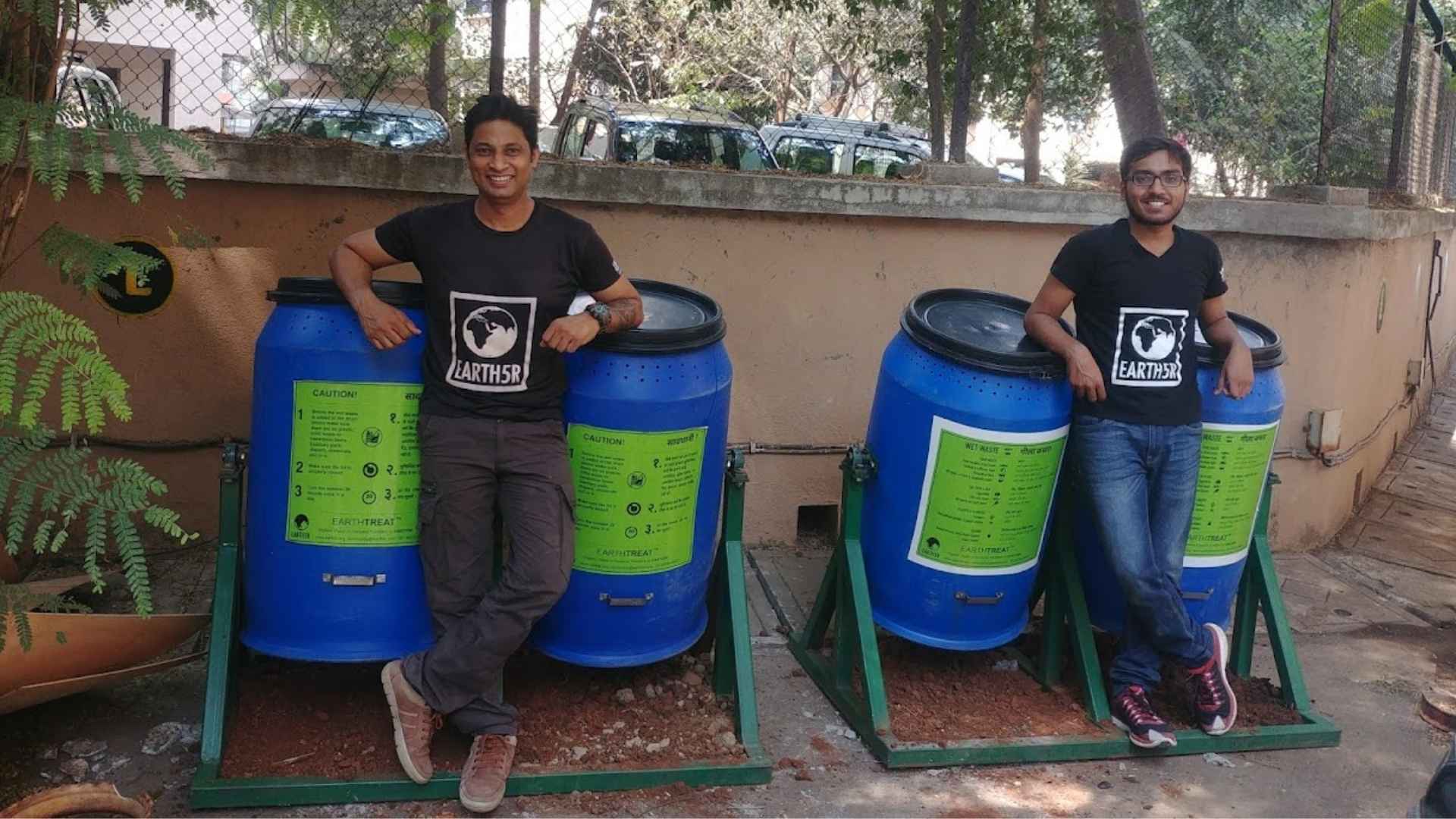The Waste Crisis and the Need for Zero-Waste Residential Societies
In today’s rapidly urbanizing world, residential societies are grappling with an ever-growing waste crisis. From plastic packaging and food scraps to electronic waste and disposable household items, the sheer volume of waste generated daily is staggering. According to a report by the World Bank, global waste production is expected to reach 3.4 billion metric tons by 2050, a nearly 70% increase from 2016 levels.
Residential societies play a pivotal role in combating this crisis. Unlike isolated households, residential complexes generate waste on a larger, collective scale, making them ideal hubs for implementing effective waste management strategies. By adopting zero-waste practices, these societies can significantly reduce their environmental footprint.
The impact of adopting zero-waste practices in residential societies is both environmental and economic. Scientific studies show that landfills are one of the largest sources of methane emissions, a potent greenhouse gas that is 25 times more effective at trapping heat in the atmosphere than carbon dioxide.
A study published in the journal Nature Climate Change revealed that reducing organic waste through composting in residential communities could cut methane emissions by up to 50%. Additionally, a report by the Ellen MacArthur Foundation found that implementing circular waste management systems in residential areas could reduce waste-related costs by up to 20% through improved resource efficiency.
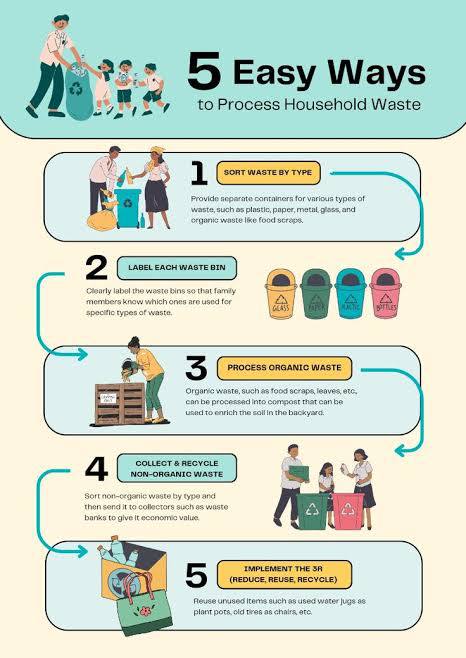
This image outlines five simple yet effective steps for processing household waste, including sorting by type, labeling bins, and recycling. It promotes the 3R approach—Reduce, Reuse, and Recycle—to encourage sustainable waste management practices.
Understanding Zero-Waste: What It Means and Why It Matters
In a world drowning in garbage, zero-waste living has emerged as a powerful solution to combat the growing waste crisis. At its core, zero-waste is more than just a buzzword—it is a holistic lifestyle and waste management philosophy that aims to minimize waste sent to landfills or incinerators.
The scientific benefits of zero-waste societies are profound. One of the most significant advantages is the reduction in carbon footprint. According to a report by the United Nations Environment Programme (UNEP), nearly 5% of global greenhouse gas emissions are generated by waste decomposition in landfills.
A study published in Waste Management & Research found that community-wide composting programs reduced landfill-bound waste by up to 40%, directly cutting down on methane emissions.
Beyond reducing emissions, zero-waste living helps conserve natural resources. Recycling aluminum, for example, uses 95% less energy compared to producing new aluminum from raw materials, according to the US Environmental Protection Agency (EPA). Similarly, recycling one ton of paper can save 17 trees, 7,000 gallons of water, and 4,100 kilowatt-hours of electricity, highlighting how zero-waste practices can protect forests and reduce water and energy consumption.
Waste Audit and Segregation – The Foundation of Zero-Waste Societies
The importance of waste audits is backed by scientific evidence. According to a study published in the journal Waste Management, residential complexes that conducted regular waste audits saw a 30-50% reduction in landfill-bound waste within the first year. This is because audits reveal avoidable waste—such as food scraps that could be composted or recyclable items that are being discarded incorrectly.
For instance, in a 2019 pilot project in Bengaluru, apartment complexes conducted waste audits and discovered that nearly 60% of their waste was organic and could be composted, significantly reducing their landfill contributions.
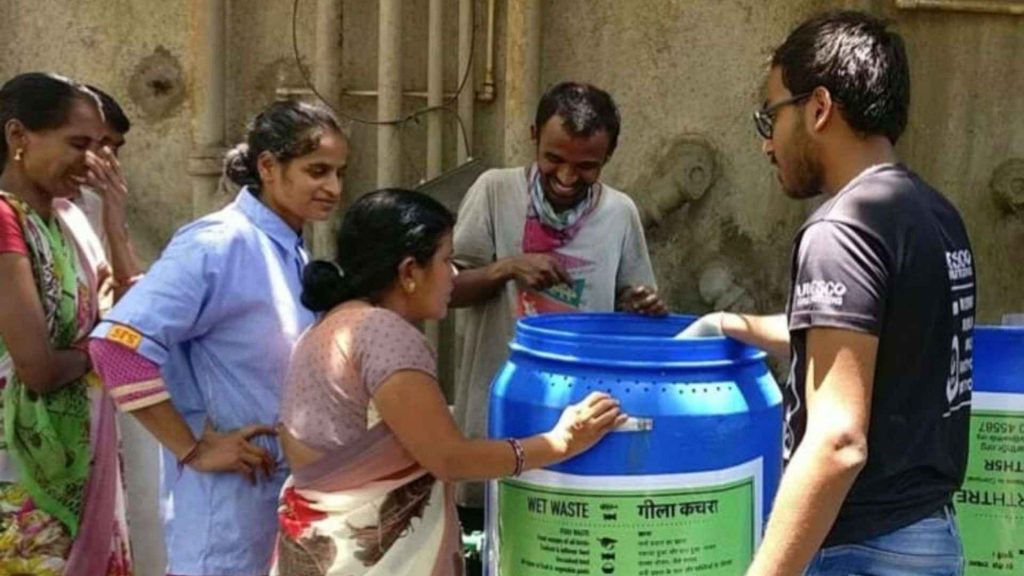
A 2018 study by the Journal of Environmental Management found that communities using color-coded bins increased their recycling efficiency by 47%, compared to those using unmarked or poorly labeled containers.
Beyond improving recycling rates, proper segregation significantly reduces landfill burden. When organic waste is separated from dry waste, it can be composted, preventing the release of methane—a potent greenhouse gas—from rotting food in landfills.
The US Environmental Protection Agency (EPA) reports that diverting organic waste through composting can reduce methane emissions by over 50%, making it a vital step in combating climate change. Moreover, cleaner, uncontaminated recyclable waste is easier to process, making recycling plants more efficient and profitable.
Setting Up a Recycling and Upcycling System – Transforming Waste into Value
Building a zero-waste residential society is incomplete without an efficient recycling and upcycling system. While recycling focuses on reprocessing waste materials into new products, upcycling takes it a step further by creatively repurposing discarded items into something of higher value.
The foundation of a successful recycling system lies in collaboration with local recycling facilities. Residential societies need to establish formal partnerships with certified recyclers who can handle various waste streams, including paper, plastics, metals, and e-waste.
For instance, in cities like Pune and Bengaluru, housing complexes collaborate with local NGOs and municipal recycling centers, ensuring that their segregated waste is processed responsibly. According to a study published in the journal Resources, Conservation & Recycling, residential societies that partnered with local recycling units were able to cut down their landfill waste by over 60% within two years.
Regular collection drives further enhance the effectiveness of recycling programs. Organizing monthly or bi-monthly drives for e-waste, plastics, and paper ensures that residents dispose of their recyclables properly rather than mixing them with regular garbage.
E-waste drives, in particular, are crucial since electronic waste contains toxic heavy metals such as lead, mercury, and cadmium, which can leach into the soil and groundwater if not recycled properly. According to the Global E-waste Monitor 2020, only 17.4% of e-waste is currently recycled worldwide, highlighting the urgent need for dedicated collection systems.
While recycling handles traditional waste, upcycling breathes new life into discarded items. This creative practice involves repurposing old clothes, furniture, and household items into functional or decorative products. For example, worn-out denim jeans can be turned into stylish tote bags, while old wooden pallets can be upcycled into rustic garden benches.
Encouraging Sustainable Consumption Habits – Reducing Waste at the Source
According to a report by the World Economic Forum, packaging makes up approximately 40% of global plastic waste, much of which ends up in landfills or oceans. By choosing products with biodegradable or recyclable packaging, residents can drastically cut down on non-recyclable waste. For example, buying loose fruits and vegetables instead of pre-packaged ones reduces unnecessary plastic waste.
For instance, purchasing locally made organic soaps wrapped in compostable paper rather than mass-produced soaps in plastic containers reduces both packaging waste and environmental impact. According to a 2019 Nielsen report, 73% of global consumers say they would alter their consumption habits to reduce environmental impact, indicating a growing preference for sustainable brands.
According to National Geographic, using a reusable bottle over a disposable one can prevent the disposal of 167 plastic bottles per person annually. Similarly, bringing reusable containers for bulk buying reduces packaging waste.

Smart meal planning also plays a key role in reducing food wastage—a major contributor to household waste. By carefully planning meals, purchasing only what is necessary, and storing food properly, residential societies can reduce the amount of food that goes to waste.
A study published in the journal PLOS ONE found that households that implemented meal planning and proper food storage techniques reduced food waste by up to 28%. Furthermore, leftover food can be composted into nutrient-rich soil, creating a closed-loop system that benefits community gardens.
Engaging the Community and Spreading Awareness – The Power of Collective Action
Building a zero-waste residential society is not a solitary effort—it thrives on active community participation. When residents are engaged and informed, they become stakeholders in the sustainability process, transforming waste management from a mere chore into a shared social responsibility. Community involvement not only increases the efficiency of waste reduction programs but also fosters a culture of environmental consciousness that can have a long-term impact.
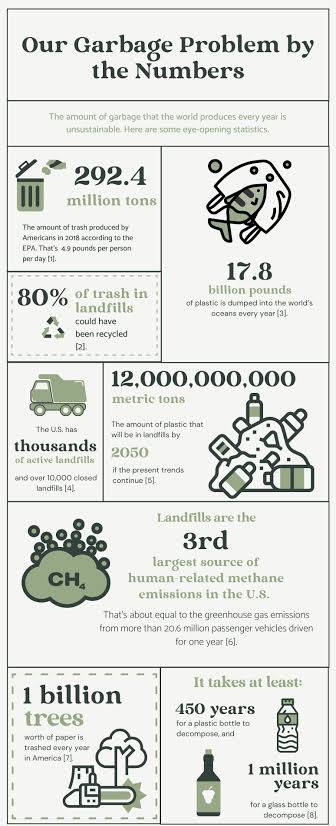
This image highlights the staggering impact of global waste production, revealing alarming statistics about landfill overflow, plastic pollution, and methane emissions. It emphasizes the urgent need for recycling, waste reduction, and sustainable practices to protect the environment.
The importance of community participation in zero-waste initiatives is backed by scientific evidence. A study published in the journal Sustainability found that residential societies with active community engagement reduced their landfill waste by over 50% compared to societies with passive or top-down waste management programs.
This is because informed and motivated residents are more likely to practice proper waste segregation, participate in recycling drives, and support sustainable practices. Moreover, when waste management becomes a collaborative effort, it fosters a sense of ownership and pride in the community.
For example, residential societies in Mumbai and Bengaluru have successfully hosted composting workshops, where residents learned how to convert food scraps into nutrient-rich compost. Such hands-on experiences not only educate residents but also empower them to adopt sustainable practices in their daily lives.
Introducing waste management challenges and reward programs is another powerful strategy to promote community participation. Friendly competitions between apartment buildings or individual households—such as “The Greenest Block” or “Zero-Waste Champion” challenges—can encourage residents to reduce waste, recycle effectively, and compost diligently.
To motivate participation, societies can offer incentives like discounts on maintenance fees or vouchers for eco-friendly products. According to a 2017 study in the Journal of Environmental Psychology, incentive-based programs increased recycling participation by up to 60%, demonstrating the effectiveness of using rewards to encourage sustainable behavior.
Case studies from Earth5R : Real life impact
Zero-Waste and Compost Units in Ghatkopar
On June 16, Earth5R installed a composting unit at ‘Parvati Heritage’ society in Ghatkopar. The team trained residents and housekeeping staff on waste segregation into recyclable, biodegradable, and refuse categories. They emphasized the importance of source-level segregation to prevent contamination, ensuring organic waste remains compostable and recyclables retain their value. A live demonstration showcased the composting process, highlighting how regular turning of the unit aids aeration. The produced compost benefits house gardens and is also donated to farmers in Aarey Colony, promoting sustainable agriculture.
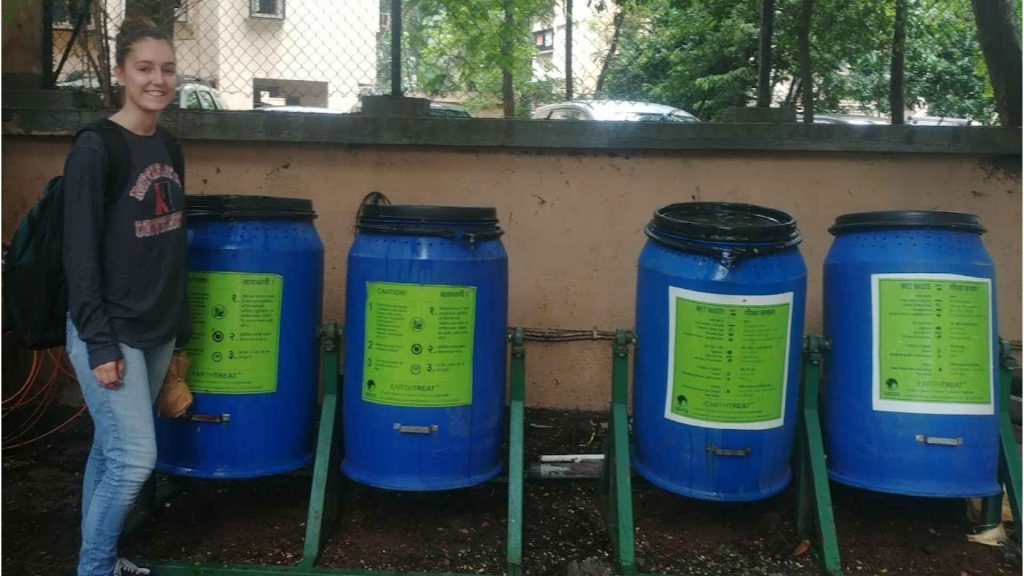
Sustainable Powai Initiative
Powai, often dubbed the new Silicon Valley of India, has experienced rapid urbanization, leading to increased waste production. Earth5R’s ‘Green Citizens’ program in Powai focuses on transforming residential areas into zero-waste zones. For instance, Octavius Society installed an organic waste compost unit capable of processing three tons of organic waste monthly. The compost produced is utilized in local gardens and donated to nearby farmers, enhancing soil fertility. Earth5R also conducted workshops to educate residents and staff on waste segregation and the benefits of composting, fostering community involvement in sustainable practices.
Waste Management and Circular Economy in Sakinaka
In the Sakinaka region of Mumbai, Earth5R addressed the lack of formal waste management systems in densely populated slum areas. Volunteers trained 45 families on waste segregation, recycling, and composting methods. They emphasized the environmental and health hazards of improper waste disposal, such as dumping plastics into nearby water bodies. The training aimed to reduce environmental pollution and provided locals with opportunities to earn a livelihood by reusing and recycling waste, thereby fostering a circular economy.
Building Sustainable Communities in Mumbai
Earth5R’s Circular Economy program extends to Mumbai’s slum areas, where formal waste management systems are often absent. Volunteers conducted on-ground training sessions, educating residents about the hazards of open dumping and teaching methods to reduce household waste. Under the Livelihood Program, locals, especially women, were trained in upcycling, enabling them to create and sell products made from waste materials. This initiative not only addresses waste management but also empowers community members economically.
These case studies demonstrate Earth5R’s commitment to fostering zero-waste residential societies through community engagement, education, and sustainable waste management practices.
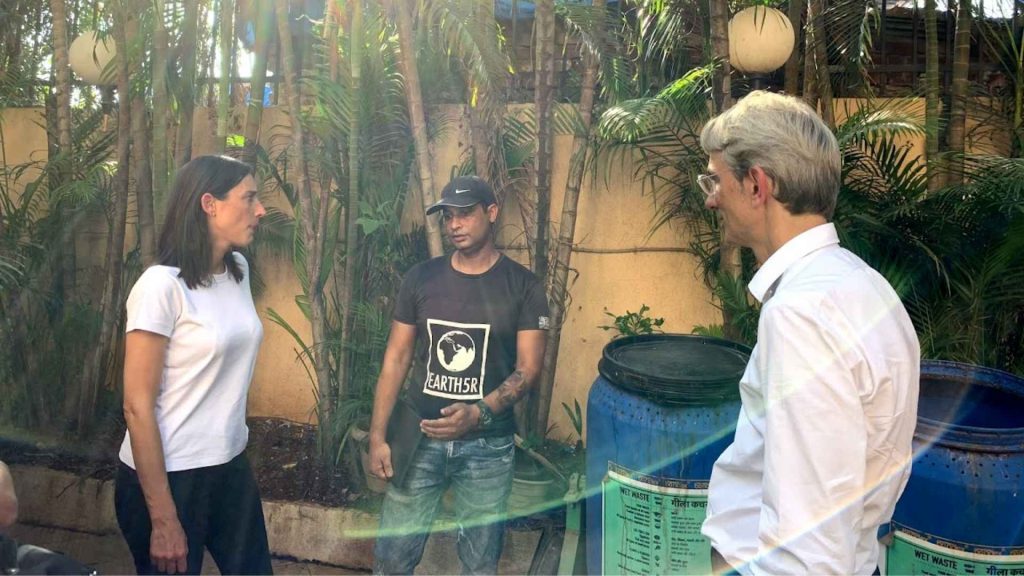
Challenges and Solutions in Creating Zero-Waste Societies – Overcoming the Roadblocks
One of the most significant challenges is resistance to change, particularly among residents who are accustomed to conventional waste disposal practices. Shifting to a zero-waste lifestyle often requires behavioral adjustments, such as waste segregation, composting, and recycling—tasks that some individuals may perceive as inconvenient or time-consuming.
According to a study published in the journal Waste Management & Research, lack of motivation and habit inertia are among the primary barriers to adopting sustainable waste practices. The same study found that reward-based initiatives increased recycling rates by up to 45%, demonstrating the power of positive reinforcement.
Lack of infrastructure is another major hurdle. Many residential societies lack proper waste management facilities, such as composting units, recycling collection points, or dedicated e-waste bins. Without convenient access to waste disposal resources, even environmentally conscious residents may struggle to comply with zero-waste practices.
To tackle this issue, societies can collaborate with municipal bodies or private waste management companies to install on-site recycling stations and composting facilities. For example, residential communities in Pune and Chennai have partnered with local NGOs to set up decentralized composting units, significantly reducing the volume of waste sent to landfills.
Inconsistent participation among residents is another common challenge. While some individuals may be committed to zero-waste practices, others may remain indifferent, creating inconsistencies that weaken the overall impact. To promote consistent participation, continuous awareness campaigns are essential.
Organizing regular workshops, webinars, and awareness drives keeps residents informed and motivated. Scientific evidence supports this approach—a 2019 study in the Journal of Environmental Education found that frequent awareness campaigns led to a 35% increase in consistent waste segregation practices in residential areas.
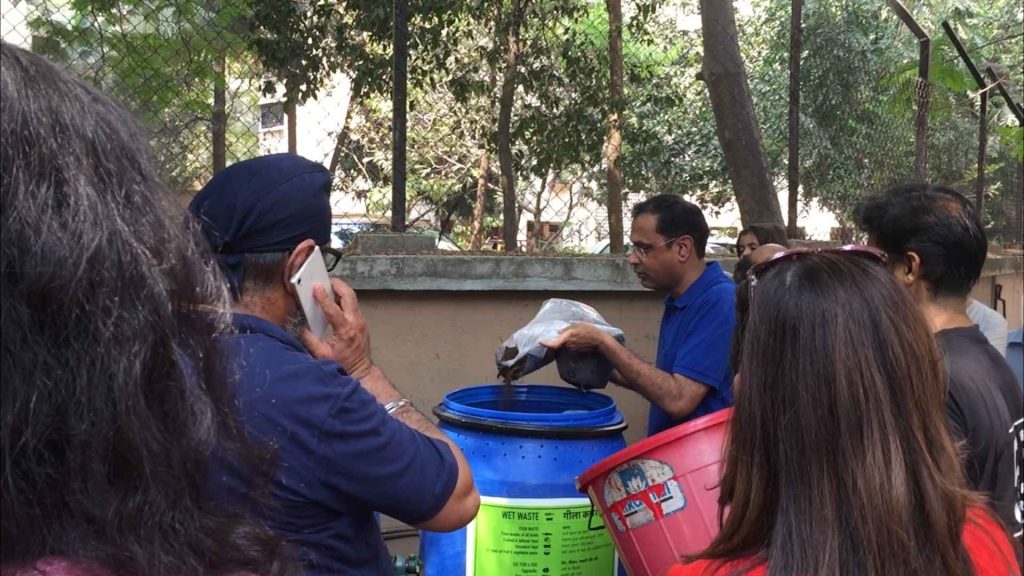
Paving the Way for Zero-Waste Residential Societies
Creating a zero-waste residential society is not merely an environmental initiative—it is a transformative movement that redefines how communities view and manage waste.
By implementing practical, science-backed steps such as conducting waste audits, practicing segregation, establishing recycling and upcycling systems, encouraging sustainable consumption, and fostering community engagement, residential societies can significantly reduce their waste footprint.
The long-term benefits of zero-waste societies extend far beyond waste reduction. Environmentally, they help conserve natural resources, minimize landfill overflow, and reduce harmful greenhouse gas emissions.
Socially, they enhance public health by curbing waste pollution and promoting cleaner living environments. According to the World Bank, cities that invest in sustainable waste management systems can save millions in waste-related expenses while improving the quality of life for their residents.
Ultimately, building a zero-waste society is not a distant ideal—it is an achievable reality, powered by collective action and unwavering commitment. By embracing these actionable steps, residential societies can protect the planet for future generations, fostering a world where waste is no longer seen as garbage but as a valuable resource with limitless potential.
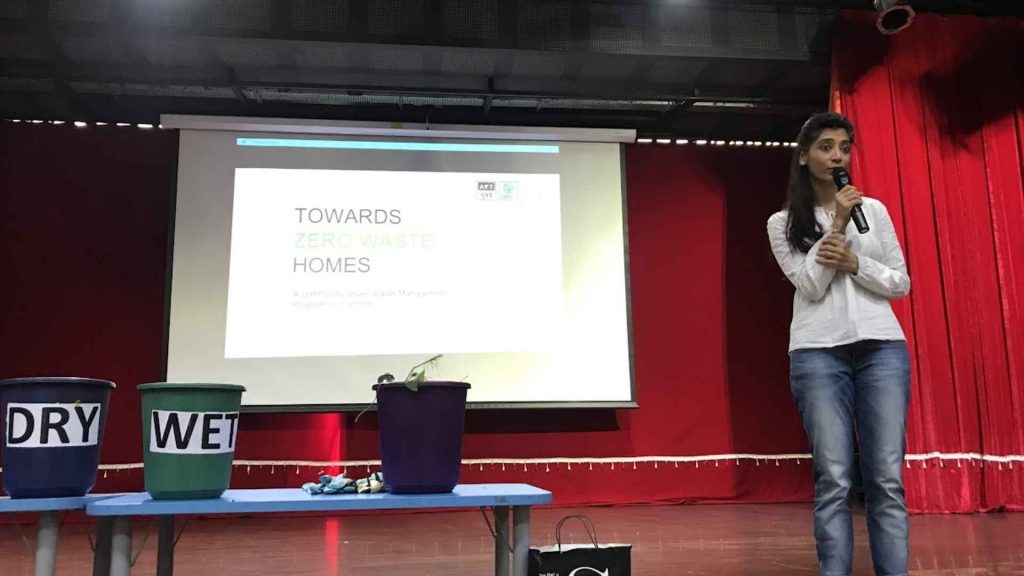
FAQs on Actionable Steps to Create Zero-Waste Residential Societies
What does it mean to create a zero-waste residential society?
A zero-waste residential society aims to minimize waste generation and landfill contributions by promoting waste reduction, segregation, recycling, and upcycling. The goal is to create a closed-loop system where waste is either repurposed, reused, or composted, significantly reducing environmental impact.
How can residential societies begin their zero-waste journey?
The first step is to conduct a waste audit to identify the major waste contributors, such as food waste, plastic, or paper. Based on the findings, societies can implement waste segregation systems, collaborate with local recycling facilities, and promote sustainable consumption habits.
Why is waste segregation so important?
Proper waste segregation prevents recyclable and compostable materials from ending up in landfills, making recycling and composting processes more efficient. It also reduces landfill methane emissions, a major contributor to climate change, and helps recover valuable resources.
What types of waste should be segregated?
Waste should be separated into organic waste (food scraps, garden waste), recyclable waste (plastic, paper, metal, glass), and non-recyclable waste (contaminated or hazardous materials). E-waste should be collected separately for safe disposal.
How can societies promote recycling effectively?
Societies can collaborate with local recycling centers, organize monthly collection drives for e-waste, plastics, and paper, and educate residents on proper recycling practices through workshops and informational posters.
What is the role of upcycling in zero-waste societies?
Upcycling involves repurposing discarded items into valuable products. For example, old clothes can be turned into reusable bags, and glass jars can be used as storage containers.
How can residential societies reduce food waste?
By encouraging smart meal planning, proper food storage, and composting, societies can significantly reduce food waste. Composting converts food scraps into nutrient-rich soil, preventing organic waste from ending up in landfills.
What infrastructure is needed for effective waste management?
Residential societies need color-coded bins for segregation, composting units for organic waste, and partnerships with local recycling facilities. Setting up designated e-waste collection points is also essential.
How can societies engage residents in zero-waste practices?
Regular workshops, seminars, and awareness campaigns educate and motivate residents. Reward programs, such as eco-points or green incentives, encourage consistent participation.
What are some practical steps individuals can take to support zero-waste living?
Residents can use reusable bags, bottles, and containers, buy products with minimal packaging, and support local and sustainable brands. Practicing waste segregation and composting at home also contributes significantly.
How can teachers and parents promote zero-waste habits in children?
By incorporating eco-friendly projects and activities into school curriculums and encouraging waste reduction habits at home, children learn the importance of sustainable living. Parents and teachers can also lead by example through responsible waste practices.
What are the benefits of community-wide composting initiatives?
Composting reduces landfill waste, lowers methane emissions, and produces natural fertilizer for gardens. It also creates a circular waste management system, benefiting the community and the environment.
How do zero-waste societies reduce greenhouse gas emissions?
By diverting organic waste from landfills, societies prevent the release of methane—a potent greenhouse gas. Recycling and upcycling reduce the need for energy-intensive production processes, lowering carbon emissions.
What challenges do societies face in creating zero-waste systems?
Common challenges include resistance to change, lack of infrastructure, and inconsistent participation. However, these can be addressed through incentive programs, regular education campaigns, and collaboration with waste management services.
How can residential societies promote sustainable consumption?
By choosing products with minimal packaging, supporting eco-conscious brands, and promoting bulk buying with reusable containers, societies can significantly reduce waste at the source.
What is the impact of zero-waste practices on public health?
Zero-waste societies experience improved air and water quality due to reduced waste pollution. Proper waste management also minimizes exposure to hazardous chemicals, promoting better health for residents.
Can zero-waste practices lead to financial benefits for societies?
Yes. By reducing landfill waste, societies cut down on disposal costs. Composting reduces the need for chemical fertilizers, and upcycling can generate income from repurposed products.
How can societies ensure consistent participation in zero-waste initiatives?
Consistency can be maintained through regular awareness campaigns, workshops, and reward-based programs. Publicly celebrating achievements, such as reduced landfill waste, can boost community morale.
What role do local governments and municipal bodies play in zero-waste societies?
Local authorities can support residential societies by providing recycling infrastructure, offering waste management resources, and enforcing waste segregation policies. Collaboration with municipalities enhances efficiency.
How can zero-waste societies inspire broader change?
By leading by example, zero-waste residential societies can inspire neighboring communities, schools, and organizations to adopt sustainable practices. Sharing success stories through social media and local events can amplify their impact.
– Authored by Mridu Mishra

